- Home
- Arthur Conan Doyle
Beyond The City Page 6
Beyond The City Read online
Page 6
Ida burst out laughing. "What can have put such a notion into your head, Clara?"
"It is only too true, Ida. I suspected it before, and he himself almost told me as much with his own lips to-night. I don't think that it is a laughing matter."
"Really, I could not help it. If you had told me that those two dear old ladies opposite, the Misses Williams, were both engaged, you would not have surprised me more. It is really too funny."
"Funny, Ida! Think of any one taking the place of dear mother.
But her sister was of a more practical and less sentimental nature. "I am sure," said she, "that dear mother would like papa to do whatever would make him most happy. We shall both be away, and why should papa not please himself?"
"But think how unhappy he will be. You know how quiet he is in his ways, and how even a little thing will upset him. How could he live with a wife who would make his whole life a series of surprises? Fancy what a whirlwind she must be in a house. A man at his age cannot change his ways. I am sure he would be miserable."
Ida's face grew graver, and she pondered over the matter for a few minutes. "I really think that you are right as usual," said she at last. "I admire Charlie's aunt very much, you know, and I think that she is a very useful and good person, but I don't think she would do as a wife for poor quiet papa."
"But he will certainly ask her, and I really think that she intends to accept him. Then it would be too late to interfere. We have only a few days at the most. And what can we do? How can we hope to make him change his mind?"
Again Ida pondered. "He has never tried what it is to live with a strong-minded woman," said she. "If we could only get him to realize it in time. Oh, Clara, I have it; I have it! Such a lovely plan!" She leaned back in her chair and burst into a fit of laughter so natural and so hearty that Clara had to forget her troubles and to join in it.
"Oh, it is beautiful!" she gasped at last. "Poor papa! What a time he will have! But it's all for his own good, as he used to say when we had to be punished when we were little. Oh, Clara, I do hope your heart won't fail you.
"I would do anything to save him, dear."
"That's it. You must steel yourself by that thought."
"But what is your plan?"
"Oh, I am so proud of it. We will tire him for ever of the widow, and of all emancipated women. Let me see, what are Mrs. Westmacott's main ideas? You have listened to her more than I. Women should attend less to household duties. That is one, is it not?"
"Yes, if they feel they have capabilities for higher things. Then she thinks that every woman who has leisure should take up the study of some branch of science, and that, as far as possible, every woman should qualify herself for some trade or profession, choosing for preference those which have been hitherto monopolized by men. To enter the others would only be to intensify the present competition."
" Quite so. That is glorious!" Her blue eyes were dancing with mischief, and she clapped her hands in her delight. "What else? She thinks that whatever a man can do a woman should be allowed to do also-does she not?"
"She says so."
"And about dress? The short skirt, and the divided skirt are what she believes in?"
"Yes."
"We must get in some cloth."
"Why?"
"We must make ourselves a dress each. A brand-new, enfranchised, emancipated dress, dear. Don't you see my plan? We shall act up to all Mrs. Westmacott's views in every respect, and improve them when we can. Then papa will know what it is to live with a woman who claims all her rights. Oh, Clara, it will be splendid."
Her milder sister sat speechless before so daring a scheme. "But it would be wrong, Ida!" she cried at last.
"Not a bit. It is to save him."
"I should not dare."
"Oh, yes, you would. Harold will help. Besides, what other plan have you?"
"I have none."
"Then you must take mine."
"Yes. Perhaps you are right. Well, we do it for a good motive.
"You will do it?"
"I do not see any other way."
"You dear good Clara! Now I will show you what you are to do. We must not begin too suddenly. It might excite suspicion."
"What would you do, then?"
"Tomorrow we must go to Mrs. Westmacott, and sit at her feet and learn all her views."
"What hypocrites we shall feel!"
"We shall be her newest and most enthusiastic converts. Oh, it will be such fun, Clara! Then we shall make our plans and send for what we want, and begin our new life."
"I do hope that we shall not have to keep it up long. It seems so cruel to dear papa.
"Cruel! To save him!"
"I wish I was sure that we were doing right. And yet what else can we do? Well, then, Ida, the die is cast, and we will call upon Mrs. Westmacott tomorrow.
Chapter 9 – A Family Plot
Little did poor Doctor Walker imagine as he sat at his breakfast-table next morning that the two sweet girls who sat on either side of him were deep in a conspiracy, and that he, munching innocently at his muffins, was the victim against whom their wiles were planned. Patiently they waited until at last their opening came.
"It is a beautiful day," he remarked. "It will do for Mrs. Westmacott. She was thinking of having a spin upon the tricycle."
"Then we must call early. We both intended to see her after breakfast."
"Oh, indeed!" The Doctor looked pleased.
"You know, pa," said Ida, "it seems to us that we really have a very great advantage in having Mrs. Westmacott living so near."
"Why so, dear?"
"Well, because she is so advanced, you know. If we only study her ways we may advance ourselves also."
"I think I have heard you say, papa," Clara remarked, "that she is the type of the woman of the future."
"I am very pleased to hear you speak so sensibly, my dears. I certainly think that she is a woman whom you may very well take as your model. The more intimate you are with her the better pleased I shall be."
"Then that is settled," said Clara demurely, and the talk drifted to other matters.
All the morning the two girls sat extracting from Mrs. Westmacott her most extreme view as to the duty of the one sex and the tyranny of the other. Absolute equality, even in details, was her ideal. Enough of the parrot cry of unwomanly and unmaidenly. It had been invented by man to scare woman away when she poached too nearly upon his precious preserves. Every woman should be independent. Every woman should learn a trade. It was their duty to push in where they were least welcome. Then they were martyrs to the cause, and pioneers to their weaker sisters. Why should the wash-tub, the needle, and the housekeeper's book be eternally theirs? Might they not reach higher, to the consulting-room, to the bench, and even to the pulpit? Mrs. Westmacott sacrificed her tricycle ride in her eagerness over her pet subject, and her two fair disciples drank in every word, and noted every suggestion for future use. That afternoon they went shopping in London, and before evening strange packages began to be handed in at the Doctor's door. The plot was ripe for execution, and one of the conspirators was merry and jubilant, while the other was very nervous and troubled.
When the Doctor came down to the dining-room next morning, he was surprised to find that his daughters had already been up some time. Ida was installed at one end of the table with a spirit-lamp, a curved glass flask, and several bottles in front of her. The contents of the flask were boiling furiously, while a villainous smell filled the room. Clara lounged in an arm-chair with her feet upon a second one, a blue-covered book in her hand, and a huge map of the British Islands spread across her lap. "Hullo!" cried the Doctor, blinking and sniffing, "where's the breakfast?"
"Oh, didn't you order it?" asked Ida.
"I! No; why should I?" He rang the bell. "Why have you not laid the breakfast, Jane?"
"If you please, sir, Miss Ida was a workin' at the table."
"Oh, of course, Jane," said the young lady calmly. "I am so sorr
y. I shall be ready to move in a few minutes."
"But what on earth are you doing, Ida?" asked the Doctor. "The smell is most offensive. And, good gracious, look at the mess which you have made upon the cloth! Why, you have burned a hole right through."
"Oh, that is the acid," Ida answered contentedly. "Mrs. Westmacott said that it would burn holes."
"You might have taken her word for it without trying," said her father dryly.
"But look here, pa! See what the book says: `The scientific mind takes nothing upon trust. Prove all things!' I have proved that."
"You certainly have. Well, until breakfast is ready I'll glance over the Times. Have you seen it?"
"The Times? Oh, dear me, this is it which I have under my spirit-lamp. I am afraid there is some acid upon that too, and it is rather damp and torn. Here it is."
The Doctor took the bedraggled paper with a rueful face. "Everything seems to be wrong to-day," he remarked. "What is this sudden enthusiasm about chemistry, Ida?"
"Oh, I am trying to live up to Mrs. Westmacott's teaching."
"Quite right! quite right!" said he, though perhaps with less heartiness than he had shown the day before. "Ah, here is breakfast at last!"
But nothing was comfortable that morning. There were eggs without egg-spoons, toast which was leathery from being kept, dried-up rashers, and grounds in the coffee. Above all, there was that dreadful smell which pervaded everything and gave a horrible twang to every mouthful.
"I don't wish to put a damper upon your studies, Ida," said the Doctor, as he pushed back his chair. "But I do think it would be better if you did your chemical experiments a little later in the day."
"But Mrs. Westmacott says that women should rise early, and do their work before breakfast."
"Then they should choose some other room besides the breakfast-room." The Doctor was becoming just a little ruffled. A turn in the open air would soothe him, he thought. "Where are my boots?" he asked.
But they were not in their accustomed corner by his chair. Up and down he searched, while the three servants took up the quest, stooping and peeping under book-cases and drawers. Ida had returned to her studies, and Clara to her blue-covered volume, sitting absorbed and disinterested amid the bustle and the racket. At last a general buzz of congratulation announced that the cook had discovered the boots hung up among the hats in the hall. The Doctor, very red and flustered, drew them on, and stamped off to join the Admiral in his morning walk.
As the door slammed Ida burst into a shout of laughter. "You see, Clara," she cried, "the charm works already. He has gone to number one instead of to number three. Oh, we shall win a great victory. You've been very good, dear; I could see that you were on thorns to help him when he was looking for his boots."
"Poor papa! It is so cruel. And yet what are we to do?"
"Oh, he will enjoy being comfortable all the more if we give him a little discomfort now. What horrible work this chemistry is! Look at my frock! It is ruined. And this dreadful smell!" She threw open the window, and thrust her little golden-curled head out of it. Charles Westmacott was hoeing at the other side of the garden fence.
"Good morning, sir," said Ida.
"Good morning!" The big man leaned upon his hoe and looked up at her.
"Have you any cigarettes, Charles?"
"Yes, certainly."
"Throw me up two."
"Here is my case. Can you catch!"
A seal-skin case came with a soft thud on to the floor. Ida opened it. It was full.
"What are these?" she asked.
"Egyptians."
"What are some other brands?"
"Oh, Richmond Gems, and Turkish, and Cambridge. But why?"
"Never mind!" She nodded to him and closed the window. "We must remember all those, Clara," said she. "We must learn to talk about such things. Mrs. Westmacott knows all about the brands of cigarettes. Has your rum come?"
"Yes, dear. It is here."
"And I have my stout. Come along up to my room now. This smell is too abominable. But we must be ready for him when he comes back. If we sit at the window we shall see him coming down the road."
The fresh morning air, and the genial company of the Admiral had caused the Doctor to forget his troubles, and he came back about midday in an excellent humor. As he opened the hall door the vile smell of chemicals which had spoilt his breakfast met him with a redoubled virulence. He threw open the hall window, entered the dining-room, and stood aghast at the sight which met his eyes.
Ida was still sitting among her bottles, with a lit cigarette in her left hand and a glass of stout on the table beside her. Clara, with another cigarette, was lounging in the easy chair with several maps spread out upon the floor around. Her feet were stuck up on the coal scuttle, and she had a tumblerful of some reddish-brown composition on the smoking table close at her elbow. The Doctor gazed from one to the other of them through the thin grey haze of smoke, but his eyes rested finally in a settled stare of astonishment upon his elder and more serious daughter.
"Clara!" he gasped, "I could not have believed it!"
"What is it, papa?"
"You are smoking!"
"Trying to, papa. I find it a little difficult, for I have not been used to it."
"But why, in the name of goodness-"
"Mrs. Westmacott recommends it."
"Oh, a lady of mature years may do many things which a young girl must avoid."
"Oh, no," cried Ida, "Mrs. Westmacott says that there should be one law for all. Have a cigarette, pa?"
"No, thank you. I never smoke in the morning."
"No? Perhaps you don't care for the brand. What are these, Clara?"
"Egyptians."
"Ah, we must have some Richmond Gems or Turkish. I wish, pa, when you go into town, you would get me some Turkish."
"I will do nothing of the kind. I do not at all think that it is a fitting habit for young ladies. I do not agree with Mrs. Westmacott upon the point."
"Really, pa! It was you who advised us to imitate her."
"But with discrimination. What is it that you are drinking, Clara?"
"Rum, papa."
"Rum? In the morning?" He sat down and rubbed his eyes as one who tries to shake off some evil dream. "Did you say rum?"
"Yes, pa. They all drink it in the profession which I am going to take up."
"Profession, Clara?"
"Mrs. Westmacott says that every woman should follow a calling, and that we ought to choose those which women have always avoided."
"Quite so."
"Well, I am going to act upon her advice. I am going to be a pilot."
"My dear Clara! A pilot! This is too much."
"This is a beautiful book, papa. `The Lights, Beacons, Buoys, Channels, and Landmarks of Great Britain.' Here is another, `The Master Mariner's Handbook.' You can't imagine how interesting it is."
"You are joking, Clara. You must be joking!"
"Not at all, pa. You can't think what a lot I have learned already. I'm to carry a green light to starboard and a red to port, with a white light at the mast-head, and a flare-up every fifteen minutes."
"Oh, won't it look pretty at night!" cried her sister.
"And I know the fog-signals. One blast means that a ship steers to starboard, two to port, three astern, four that it is unmanageable. But this man asks such dreadful questions at the end of each chapter. Listen to this: `You see a red light. The ship is on the port tack and the wind at north; what course is that ship steering to a point?'"
The Doctor rose with a gesture of despair. "I can't imagine what has come over you both," said he.
"My dear papa, we are trying hard to live up to Mrs. Westmacott's standard."
"Well, I must say that I do not admire the result. Your chemistry, Ida, may perhaps do no harm; but your scheme, Clara, is out of the question. How a girl of your sense could ever entertain such a notion is more than I can imagine. But I must absolutely forbid you to go further with it."
"But, pa," asked Ida, with an air of innocent inquiry in her big blue eyes, "what are we to do when your commands and Mrs. Westmacott's advice are opposed? You told us to obey her. She says that when women try to throw off their shackles, their fathers, brothers and husbands are the very first to try to rivet them on again, and that in such a matter no man has any authority."
"Does Mrs. Westmacott teach you that I am not the head of my own house?" The Doctor flushed, and his grizzled hair bristled in his anger.
"Certainly. She says that all heads of houses are relics of the dark ages."
The Doctor muttered something and stamped his foot upon the carpet. Then without a word he passed out into the garden and his daughters could see him striding furiously up and down, cutting off the heads of the flowers with a switch.
"Oh, you darling! You played your part so splendidly!" cried Ida.
"But how cruel it is! When I saw the sorrow and surprise in his eyes I very nearly put my arms about him and told him all. Don't you think we have done enough?"
"No, no, no. Not nearly enough. You must not turn weak now, Clara. It is so funny that I should be leading you. It is quite a new experience. But I know I am right. If we go an as we are doing, we shall be able to say all our lives that we have saved him. And if we don't, oh, Clara, we should never forgive ourselves."
Chapter 10 – Women Of The Future
From that day the Doctor's peace was gone. Never was a quiet and orderly household transformed so suddenly into a bear garden, or a happy man turned into such a completely miserable one. He had never realized before how entirely his daughters had shielded him from all the friction of life. Now that they had not only ceased to protect him, but had themselves become a source of trouble to him, he began to understand how great the blessing was which he had enjoyed, and to sigh for the happy days before his girls had come under the influence of his neighbor.
"You don't look happy," Mrs. Westmacott had remarked to him one morning. "You are pale and a little off color. You should come with me for a ten mile spin upon the tandem."
"I am troubled about my girls." They were walking up and down in the garden. From time to time there sounded from the house behind them the long, sad wail of a French horn.

 The Lost World
The Lost World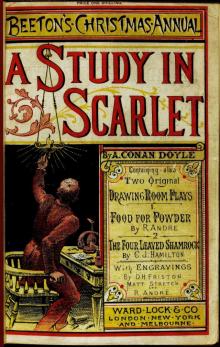 A Study in Scarlet
A Study in Scarlet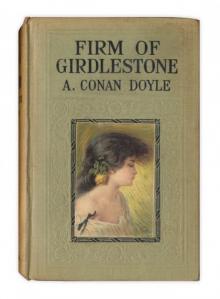 The Firm of Girdlestone
The Firm of Girdlestone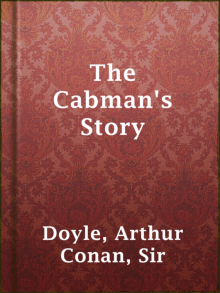 The Cabman's Story
The Cabman's Story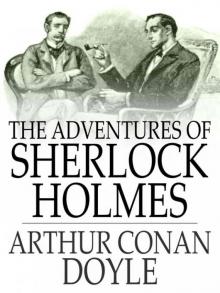 The Adventures of Sherlock Holmes
The Adventures of Sherlock Holmes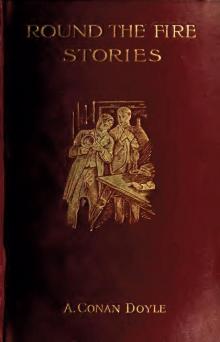 Round the Fire Stories
Round the Fire Stories His Last Bow: An Epilogue of Sherlock Holmes
His Last Bow: An Epilogue of Sherlock Holmes Micah Clarke
Micah Clarke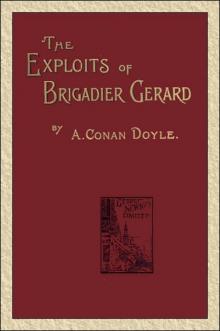 The Exploits of Brigadier Gerard
The Exploits of Brigadier Gerard The Gully of Bluemansdyke, and Other stories
The Gully of Bluemansdyke, and Other stories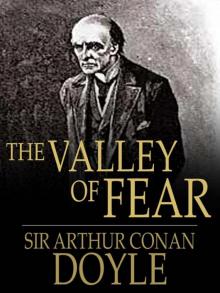 The Valley of Fear
The Valley of Fear The Last of the Legions and Other Tales of Long Ago
The Last of the Legions and Other Tales of Long Ago The Dealings of Captain Sharkey, and Other Tales of Pirates
The Dealings of Captain Sharkey, and Other Tales of Pirates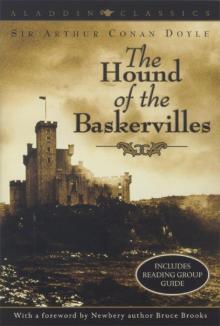 The Hound of the Baskervilles
The Hound of the Baskervilles The Great Shadow and Other Napoleonic Tales
The Great Shadow and Other Napoleonic Tales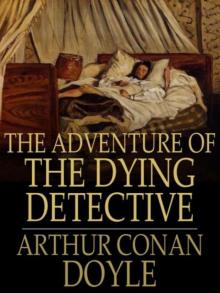 The Adventure of the Dying Detective
The Adventure of the Dying Detective The Man from Archangel, and Other Tales of Adventure
The Man from Archangel, and Other Tales of Adventure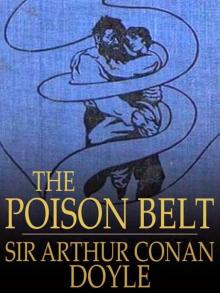 The Poison Belt
The Poison Belt The Last Galley; Impressions and Tales
The Last Galley; Impressions and Tales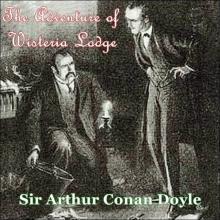 The Adventure of Wisteria Lodge
The Adventure of Wisteria Lodge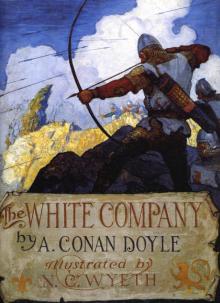 The White Company
The White Company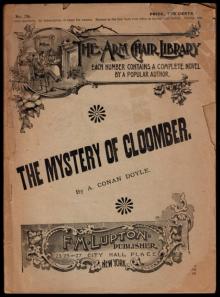 The Mystery of Cloomber
The Mystery of Cloomber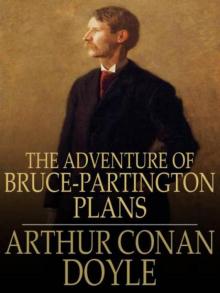 The Adventure of the Bruce-Partington Plans
The Adventure of the Bruce-Partington Plans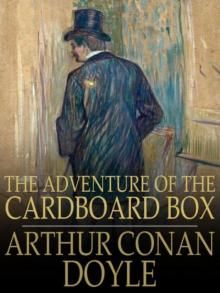 The Adventure of the Cardboard Box
The Adventure of the Cardboard Box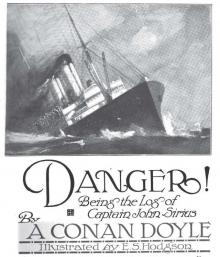 Danger! and Other Stories
Danger! and Other Stories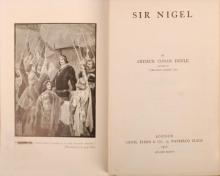 Sir Nigel
Sir Nigel The Return of Sherlock Holmes
The Return of Sherlock Holmes The Adventure of the Devil's Foot
The Adventure of the Devil's Foot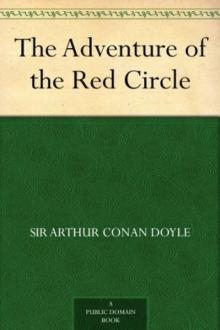 The Adventure of the Red Circle
The Adventure of the Red Circle The Memoirs of Sherlock Holmes
The Memoirs of Sherlock Holmes The Adventure of the Yellow Face
The Adventure of the Yellow Face The Adventure of the Norwood Builder
The Adventure of the Norwood Builder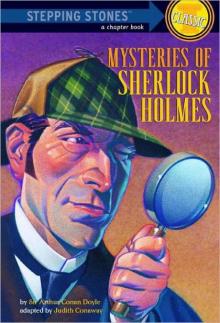 Mysteries of Sherlock Holmes
Mysteries of Sherlock Holmes The Adventure of the Missing Three-Quarter
The Adventure of the Missing Three-Quarter The Adventure of the Final Problem
The Adventure of the Final Problem A Scandal in Bohemia
A Scandal in Bohemia His Last Bow shssc-4
His Last Bow shssc-4 Beyond The City
Beyond The City The Adventure of the Gloria Scott
The Adventure of the Gloria Scott The Parasite
The Parasite The Land Of Mist pcs-3
The Land Of Mist pcs-3 The Adventure of the Musgrave Ritual
The Adventure of the Musgrave Ritual The Complete Sherlock Holmes, Volume I (Barnes & Noble Classics Series)
The Complete Sherlock Holmes, Volume I (Barnes & Noble Classics Series) The Adventure of the Stockbroker's Clerk
The Adventure of the Stockbroker's Clerk The Adventure of the Copper Beeches
The Adventure of the Copper Beeches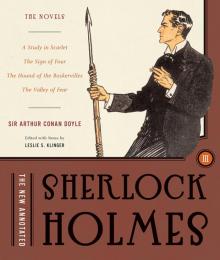 The New Annotated Sherlock Holmes
The New Annotated Sherlock Holmes When The World Screamed pcs-5
When The World Screamed pcs-5 The Adventure of the Six Napoleons
The Adventure of the Six Napoleons The Case Book of Sherlock Holmes shssc-5
The Case Book of Sherlock Holmes shssc-5 The Sign of Four
The Sign of Four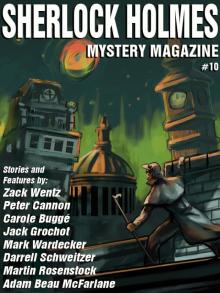 Sherlock Holmes Mystery Magazine #10
Sherlock Holmes Mystery Magazine #10 The Adventures of Brigadier Gerard
The Adventures of Brigadier Gerard The Adventure of the Second Stain
The Adventure of the Second Stain The Adventure of the Engineer's Thumb
The Adventure of the Engineer's Thumb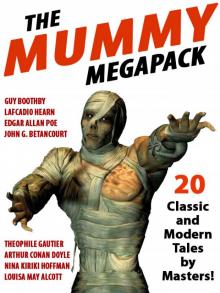 The Mummy Megapack
The Mummy Megapack The Disintegration Machine pcs-4
The Disintegration Machine pcs-4 The Maracot Deep
The Maracot Deep The Five Orange Pips
The Five Orange Pips The Adventure of the Crooked Man
The Adventure of the Crooked Man The Adventure of the Blue Carbuncle
The Adventure of the Blue Carbuncle The Adventure of Silver Blaze
The Adventure of Silver Blaze The Adventure of the Solitary Cyclist
The Adventure of the Solitary Cyclist The Adventure of the Naval Treaty
The Adventure of the Naval Treaty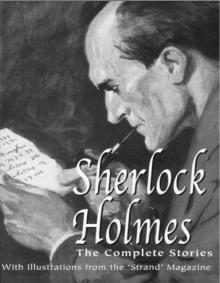 Sherlock Holmes. The Complete Stories
Sherlock Holmes. The Complete Stories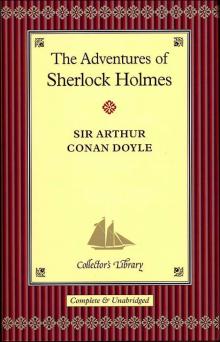 The Adventures of Sherlock Holmes (sherlock holmes)
The Adventures of Sherlock Holmes (sherlock holmes) The Adventure of the Empty House
The Adventure of the Empty House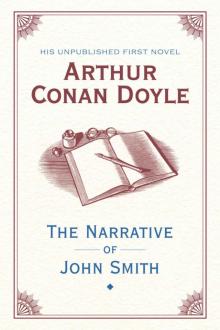 The Narrative of John Smith
The Narrative of John Smith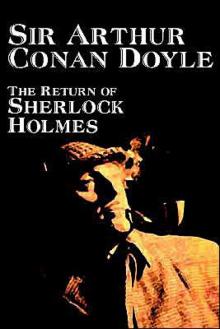 The Return of Sherlock Holmes (sherlock holmes)
The Return of Sherlock Holmes (sherlock holmes) The New Revelation
The New Revelation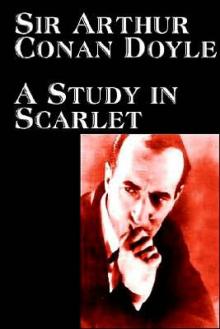 A Study in Scarlet (sherlock holmes)
A Study in Scarlet (sherlock holmes) The Vital Message
The Vital Message Sherlock Holmes Complete Collection
Sherlock Holmes Complete Collection Round the Red Lamp
Round the Red Lamp The Boscombe Valley Mystery
The Boscombe Valley Mystery The Adventure of the Beryl Coronet
The Adventure of the Beryl Coronet The Refugees
The Refugees The Adventure of the Three Students.
The Adventure of the Three Students.